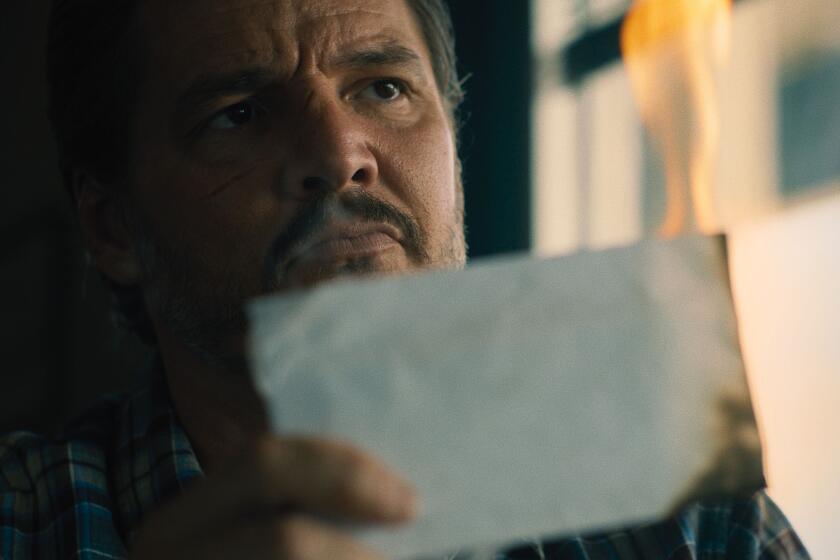MOVIE REVIEW : ‘Bride’ Weds Disappointment With Love
- Share via
Between 1907 and 1924 more than 19,000 Japanese women immigrated to Hawaii to marry Japanese sugar-cane workers. These couples knew little of each other beyond an exchange of photos. Drawing upon the actual experiences of many such women, some of them still living in their 90s, director Kayo Hatta and her sister and co-writer Mari have created the exquisite “Picture Bride,” a gentle and eloquent tale of perseverance that blossoms finally into the most tender of love stories.
Diminutive Youki Kudoh, who was one-half of the funny punk couple in Jim Jarmusch’s “Mystery Train,” plays a traditional Japanese girl, the 16-year-old Riyo. Arriving in Hawaii in 1918 full of apprehension, she quickly decides she’s made a terrible mistake. Her soon-to-be-husband Matsuji (Akira Takayama) proves to be 43, a good 20 years older than the photo of himself he sent her.
A virile man of the soil, he attempts to take her roughly on their wedding night in his modest cottage. He repels Riyo, who rejects his clumsy advances, to the extent that she becomes determined to save up her earnings to pay for her way back to Japan. We know very well that with a pay rate of 65 cents a day, minus expenses, that she is as unlikely to attain this goal as she is to give it up, so badly does she need it to sustain her in her first rugged months in the cane fields.
Once Riyo has taken considerable ribbing for being a “city girl”--she’s from Yokohama--she begins to gather strength from the earthy camaraderie of the other women, forging a friendship with the beautiful but disillusioned Kana (Tamlyn Tomita), whose handsome husband Kanzaki (Cary-Hiroyuki Tagawa) has degenerated into a drunken wife-beater.
Kanzaki has given in to the bitterness and frustration of a particularly vicious and racist cycle: The fieldworkers are supervised by a lethally brutal Portuguese, who in turn can never rise above his own station because of Anglo discrimination. Meantime, he refuses to pay Filipino workers as much as the Japanese. In short, Hatta reminds us that the racial harmony so vaunted in today’s Hawaii was not so long ago far from the norm. (Shortened considerably from its showing at Cannes last year, “Picture Bride” curiously tells of a brewing strike only to pull away from it completely.)
Hatta and her collaborators, however, bring to Riyo’s odyssey an epic vision in which the natural and the supernatural blend effortlessly, as they so often do in Japanese films. “Picture Bride” unfolds as a series of ravishingly beautiful, highly sensual images, captured by “Like Water for Chocolate” cinematographer Claudio Rocha and accompanied by Mark Adler’s shimmering score, which incorporates motifs from both Japanese and Hawaiian music.
It’s the scope and depth of Hatta’s vision, combined with its intense particularity of time and place, that gives Riyo’s story such universality; “Picture Bride” couldn’t be more Japanese--or more American. Hatta’s perspective, furthermore, allows her to be fair-minded to the disappointed, well-meaning Matsuji, even to the hateful Portuguese. The film glows with a feminine sensibility--a sensibility that reveals that strength and delicacy can go hand in hand.
Hatta is not only a visionary but also a fine director of actors. Who could have guessed at the depths Kudoh is capable of from her off-the-wall character in “Mystery Train”? Like Kudoh, Takayama shows us an individual in the process of growing, changing, adapting. Tomita makes the kind of impression you hope will be indelible with the award-givers. And Tagawa, although on screen only briefly, conveys Kanzaki’s torment fully.
Like the cherry on an ice cream sundae, “Picture Bride” is topped with a genial cameo by Toshiro Mifune as a benshi , or narrator, of the silent films he presents to the workers right smack in the fields.
* MPAA rating: PG-13, for sensuality. Times guidelines: The lovemaking is discreetly presented, and the film, which presents social and historical issues clearly, is suitable for mature early teen-agers.
(BEGIN TEXT OF INFOBOX / INFOGRAPHIC)
‘Picture Bride’ Youki Kudoh: Riyo Akira Takayama: Matsuji Tamlyn Tomita: Kana Cary-Hiroyuki Tagawa: Kanzaki Toshiro Mifune: The benshi A Miramax Films presentation of a Thousand Cranes Filmworks production. Director Kayo Hatta. Producers Lisa Onodera, Diane Mei Lin Mark. Co-executive producer Paul Mayersohn. Screenplay by Hatta and Mari Hatta; based on a story by the Hattas and Mark. Cinematographer Claudio Rocha. Editors Lynzee Klingman, Mallory Gottlieb. Costumes Ada Akaji. Music Mark Adler. Production designer Paul Guncheon. In Japanese and English, with English subtitles. Running time: 1 hour, 34 minutes.
* At the Westside Pavilion, 10800 Pico Blvd., West Los Angeles , (310) 475-0202; Beverly Center, 8500 Beverly Blvd., (310) 652-7760; and South Coast Village, 1561 Sunflower Ave., Costa Mesa. (714) 540-0594.
More to Read
Only good movies
Get the Indie Focus newsletter, Mark Olsen's weekly guide to the world of cinema.
You may occasionally receive promotional content from the Los Angeles Times.









